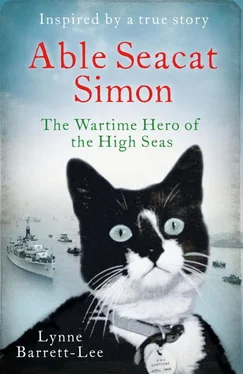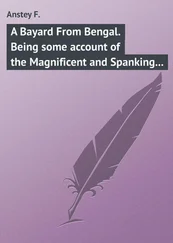It was the woman who carried me, cooing in gentle, friendly tones. I tried to feel reassured by it, shaking the sleep from my head, as the cage was borne steadily – carefully, gently – up a path, lined with more grass, to a large wooden door.
‘There,’ she said as we reached it, speaking down to me in the cage. ‘Our precious cargo delivered. We’re so excited to have you! Everyone’s so looking forward to meeting you. But first something to eat, yes? Poor mite. You must be hungry. And bewildered too, I’ll bet. You must be wondering what on earth’s going on, eh? But there’s nothing to be afraid of.’ She set the cage down on a table. Then her face loomed. A round face. A pale face. A friendly face. I couldn’t stop shaking, even so.
I was taken, still in the cage, to another compartment, and the first thing that struck me was the absence of metal. It was a huge compartment. Almost as big as the place in the picture in the paper, from where Peggy had received our awards. Oh, Peggy, I thought, feeling unbearably lonely suddenly. Everything would be so much better if Peggy was with me. I missed the smell of her. I missed her barking. I missed the sound of her sleepy whimpers – chasing rabbits in her dreams, Jack had told me. I missed the thump of her tail when it struck a piece of canvas. I even missed the sudden sprays of water when she’d been horsing around on deck and got herself drenched by the mops and the buckets. Peggy would be fine here, and I missed her so much.
But I knew I must rally and trust in the woman’s gentle tones. I was welcome. She’d told me. No one wished me any harm here. On the contrary; within minutes half a dozen people had clustered round me, one wondering if they should get me out and ‘take a proper look at me’, or leave me. Or feed me. Or simply transfer me, as it was late, to the ‘cattery’ straight away – which word sent me all into a spin once again.
In the end it was decided that, since everyone wanted to cuddle me, the best thing would be to take me out and do so. I was passed around, fussed over, and declared to be a hero. That same word again and again, and again, always said so reverentially.
So I tried hard not to quake. Tried to purr. Tried to please them. And I did rally, even when I was taken to another place – a room (that was their word for it) that was apparently going to be my home. It was almost all white, and at first sight, a more reassuring place to me: angular, functional, and reassuringly metal. It smelled a little like the Amethyst’ s sick bay.
Less reassuringly, I then saw where I was going to be billeted, which was a smaller compartment within it. It was still a cage, I supposed, but a much bigger one than I’d come in. It had a human-sized wire door, beyond which lay a basket – ‘This is your bed, Simon. Isn’t it cosy?’ said the lady – and beyond that, a rectangular tray which was filled with tiny pebbles, and to the side a brace of small shallow bowls, one containing water, the other empty.
I looked first at the ‘bed’, which was not like any bed I’d ever slept on, then up above it, where, to my immense relief, I saw there was a high place. I scampered up a gangway that seemed there specifically to take me to it, and there I stayed, trying to trick my brain into believing I was not where I was. That I had once again boarded the Amethyst, and we were sailing. And then, remembering that sleep was so often the best refuge, I slept.
On second inspection, just before sunrise the following morning, quarantine looked less terrifying than I’d first expected. Yes it was a strange place, and, despite the gangway, very different from the Amethyst , but not so different that it felt completely alien. And though the sky was still grey, and seemed to hang so low above me, there was at least a window that enabled me to see it.
It was odd knowing the world outside the window felt like home for most of my human friends, as, to me, it looked barren and strange. The skeletal trees here were nothing like banyans or tamarinds. They seemed to claw upwards towards the sky, for one thing, though below them there was enough green to cheer me up a bit. Not on the trees, but it did seem to carpet almost everywhere. When we arrived, and I’d finally been freed from the cage, it had felt strangely reminiscent of the garden around the old lady’s house.
I remembered what the man in the brown coat had said to me when we’d arrived here. ‘You’ll be treated like a king here, me little laddo,’ he’d reassured me. ‘Just you wait – you’ll be the bee’s knees and the bug’s elbows!’
I had no idea what he meant then, and I still didn’t now. But remembering it, and particularly the way he’d said it, made me resolute. I must remember there was nothing to fear here. So, mindful of Captain Griffiths, who had always led by example, I duly settled in and got on with it.
And on one level, it was an easy thing to do. The man in the brown coat had been right about my welcome. However strange my new home, I couldn’t have been treated with more kindness, particularly by the lady who’d greeted me when I’d arrived. Her name was Joan, she said, and she’d been given special responsibility for me.
Every day – twice a day, in fact – post arrived for me. Such a lot of post! Being mindful of how happy post made my shipmates, I decided the post was yet another thing to reassure me. I was thought about. I was missed. I was loved.
There were sacks and sacks of letters, of the kind I’d first seen in the wardroom, and I wished Lieutenant Hett could be with me to share them. There were more cuddly toys, things to play with, and enticing new things to eat. There were also visitors – though often strangers, who would sometimes overwhelm me. I was used to my shipmates, every last lovely man jack of them, but the seemingly endless procession of new faces (albeit smiling ones, with nothing but praise for me) began to stress me and make me keen, unbelievably, for the sanctuary of my cage. And for my high place, for which I was very grateful.
I was also visited, to my joy, by a few crew members. Not Jack, because Jack’s home on dry land was several hundred miles away. But I saw Frank and Sid, and Lieutenant Hett, and though I hated that feeling when I watched them leave the building again, it was enough to keep my spirits mostly buoyant.
Best of all, Captain Kerans and his wife, who was called Stephanie, visited twice, and on his second visit he promised me that, should it work out that way for whatever reason, I had a permanent home in England, with them. Which was a comfort, but at the same time, a worry as well. What about the Amethyst ? Would I not be given another roving commission? Would I not be able to rejoin my ship and go to sea again?
I tried to put it out of my mind and find pleasure in each day – after all, I was being treated exactly as Jack predicted: given nice things to eat, made a great deal of fuss of and, best of all, I had Joan, who had already become a friend, and who spent a lot of time playing with me every day.
I was especially grateful to Joan. Because one thing did strike me, and it struck me very quickly; I finally understood the word ‘boredom’. Without my friends and my work and the whole ship to roam, days were longer here, passing agonisingly slowly.
I remembered what Jack had told me the sailors sometimes did at such times. Mark a cross on a calendar as each day was done; create a line, then a block, then another, then another, till the days without crosses were almost none.
Perhaps I should do that, if only in my head. Mark a cross in my mind for every day that I spent here till the day came – and it would – when I finally passed muster and was allowed to pick up the thread of my seafaring life.
Читать дальше












